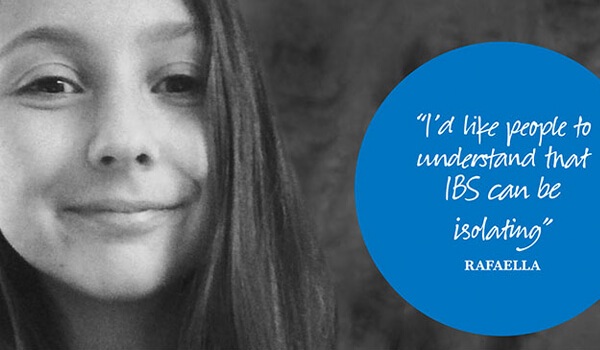“While not life-threatening, IBS can cause immense pain and discomfort for some people, and can impact people’s lives quite considerably…That’s why it’s so important to see your doctor if you’re experiencing IBS-type symptoms, for proper diagnosis and advice.
Prof. Terry Bolin – The Gut Foundation
April is IBS Awareness Month. To help raise greater public awareness about IBS and to highlight what it can be like to live with a diagnosis, we’ve reached out to individuals and their families directly affected by IBS – people who have courageously and generously shared their own personal experiences with us to help others to better understand IBS.
IBS is short for Irritable Bowel Syndrome – a collection of symptoms that result from abnormal functioning in the small and/or large bowel – the most common disorder of the human digestive tract and a medical condition still misunderstood by many.
Currently, approximately 20% of the Australia population experience IBS symptoms, with women three times more likely to experience IBS than men.
Major IBS symptoms include discomfort, pain, cramping and bloating in the abdominal area and stomach, excessive flatulence (wind), and severe constipation and chronic diarrhea (or both).
For young Rafaella from the Australian Capital Territory – diagnosed with IBS three years ago when aged nine – these symptoms have significantly impacted upon her health, her schooling, her personal life, and that of her family.
Rafaella – like many Australians– has Post-Infectious IBS – where symptoms commence and intensify following a significant bodily infection. Rafaella’s experiences also match those of one in every five Australians with IBS in 2017 – extremely debilitating symptoms and significant disruption to her daily life.
In Rafaella’s own words,
“I have Post-Infectious IBS so I normally get sick after I get a big infection… The mornings are the worst. I wake up with cramping and nausea.
I can’t even look at food and I’ve lost a lot of weight… Not only do I have to deal with my stomach upsets, I also suffer from lethargy and muscle aches, like I have the flu all the time… IBS sux!!”
In addition to the daily disruptions and discomfort of Rafaella’s IBS symptoms, equally challenging have been the psychological ups and downs that accompany them.
For Rafaella, IBS
“has stopped me from doing most things, my schooling… I have to live with this every day…I was really sick all of last term 2016. I even had to miss my final dance concert which was really disappointing… It’s hard to explain to people how bad I feel. I usually keep that to myself.”
These are all big things to deal with for a young woman making the transition from primary to high school, from childhood to adolescence. Perhaps most difficult for her has been the things that many people of all ages life struggle with in relation to medical conditions,
“the anxiety that comes with it, and how isolating it can be.”
While it is important to acknowledge the specific difficulties faced by individuals with IBS, choosing to explore IBS management and treatment options can also make a real difference, as Professor Bolin explains:
“IBS symptoms can wax and wane, and the effectiveness of treatments can vary from person to person. Some people respond well to dietary changes; however, others may only find relief through medication,”
Rafaella herself has experienced some initial success with the FODMAP diet but subsequent infections and symptoms have not led to the same outcomes. She struggles to be on a restrictive diet, has a lot of food triggers and has to be careful about everything she eats. As she herself states, “It’s hard to watch people enjoy their food”
Just as there are many ways that IBS is experienced, there are also many different remedies and strategies that are used to manage IBS symptoms. Some people find relief through relaxation and gentle exercise such as yoga, or through allied health treatments like physiotherapy or gut-directed hypnotherapy, whereas others only find their symptoms eased through the use of over-the counter or prescription medications.
Due to her age, Rafaella cannot currently access adult pain-management medications which have been shown to be effective in many other instances.
Despite the significant challenges Rafaella faces every day, she still remains hopeful despite her ongoing challenges with IBS. When we last spoke to her, Rafaella was looking forward to “seeing a new GI doctor in Sydney who is doing more tests.”
We at the Gut Foundation wholeheartedly agree with her wish that
“there was more research into IBS to find a cure for everyone going through it!”
When managing and treating your IBS symptoms and making important decisions about your health and wellbeing, always work closely with your doctor. They should always carefully explain your condition to you, answer your questions, and work with you to develop a management plan suitable for your individual needs.
Your doctor can also work with you to discover if psychological issues like anxiety, depression or stress pose a risk, challenge or problem for you. In some cases, it may be beneficial to see a psychologist or counsellor who can assist you to develop strategies for dealing with these issues and for coping with IBS.
The Gut Foundation specialises in medical research to understand the causes of gut problems, better methods of prevention and treatment, and continually educating the public on the latest findings.
